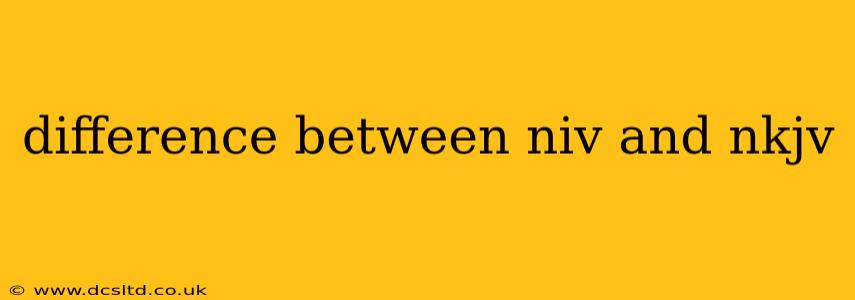Choosing a Bible translation can feel overwhelming. Two popular choices, the New International Version (NIV) and the New King James Version (NKJV), often top the list. But what are the key differences between the NIV and NKJV, and which one is right for you? This comprehensive guide breaks down the nuances, helping you make an informed decision.
What is the NIV?
The New International Version (NIV) is a contemporary translation aiming for accuracy and readability. It prioritizes clarity and natural language, making it easily accessible to modern readers. The NIV emphasizes understanding the original text's meaning and conveying it in clear, straightforward English. It's known for its smooth flow and natural phrasing, making it a popular choice for personal reading and Bible studies.
What is the NKJV?
The New King James Version (NKJV) is a modern update of the King James Version (KJV). While retaining the KJV's traditional language and style, the NKJV aims for improved accuracy based on modern scholarship. It seeks to preserve the majesty and literary beauty of the KJV while incorporating updated grammatical understanding and lexical improvements. The result is a translation that is both familiar and accessible, appealing to those who appreciate the KJV's style but desire greater accuracy.
Key Differences Between NIV and NKJV: A Side-by-Side Comparison
| Feature | NIV | NKJV |
|---|---|---|
| Translation Philosophy | Dynamic Equivalence | Essentially Literal/Formal Equivalence |
| Language Style | Contemporary, Natural, Readable | Traditional, Formal, More Archaic |
| Readability | High | Moderate to High |
| Accuracy | High (Focus on conveying meaning) | High (Focus on word-for-word accuracy) |
| Target Audience | Broader audience, including new readers | Those familiar with KJV style, traditionalists |
What are the pros and cons of each version?
NIV Pros:
- High Readability: Its modern language makes it easy to understand and enjoy.
- Accessibility: Excellent for newcomers to the Bible or those seeking a less formal reading experience.
- Clear Meaning: Focuses on conveying the original meaning clearly and concisely.
NIV Cons:
- Less Literal: Some may find its paraphrasing takes away from the precise wording of the original text.
- Potential for Ambiguity: In striving for clarity, some nuances of the original languages might be lost.
NKJV Pros:
- Traditional Language: Appeals to readers who appreciate the beauty and familiarity of the KJV style.
- Word-for-Word Accuracy: Aims for a closer adherence to the original languages' structure.
- Preserves Literary Qualities: Retains some of the literary richness of the KJV.
NKJV Cons:
- Lower Readability: The more formal language might be challenging for some readers.
- Potential for Obscurity: Strict adherence to the original wording can occasionally lead to less clear meaning.
Which Translation is Right for Me?
The "best" translation depends entirely on your personal preferences and needs.
-
Choose NIV if: You prioritize readability and ease of understanding, prefer a modern and straightforward translation, and are a new Bible reader or prefer a contemporary style.
-
Choose NKJV if: You appreciate traditional language, value a close adherence to the original text, and prefer a more formal and majestic style. You might also choose this if you're familiar with the KJV and want a modernized version while preserving the familiar style.
What other questions do people ask about NIV and NKJV?
How accurate are the NIV and NKJV?
Both the NIV and NKJV are considered highly accurate translations. However, they approach accuracy differently. The NIV prioritizes conveying the meaning accurately, even if it means paraphrasing slightly. The NKJV prioritizes a more literal, word-for-word approach, striving to remain faithful to the original text's structure. Both aim for accuracy, but their methods differ.
Which version is better for study?
This is subjective. For those comfortable with more formal language and appreciate a closer look at the original text, the NKJV might be preferable for detailed study. However, the NIV's clarity makes it accessible for a wider range of study purposes. Ultimately, the best study Bible is the one you find most engaging and conducive to your study methods.
Are there any significant theological differences?
No, there are no significant theological differences between the NIV and NKJV. Both translations represent the same underlying biblical text. Differences in wording are primarily due to their different translation philosophies.
This guide provides a starting point for understanding the nuances between the NIV and NKJV. Ultimately, the best way to decide which translation suits you is to read passages from both and see which resonates more with you. Consider borrowing or sampling different Bibles to compare them before making a purchase.
